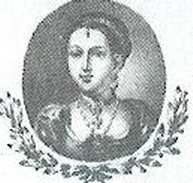Sarolt
| Sarolt of Hungary | |
|---|---|
| Grand Princess consort of the Magyars | |
| Tenure | before 972 – c. 997 |
| Born | c. 950 |
| Died | after 997 |
| Spouse | Géza of Hungary |
| Issue | Judith of Hungary Margareth, Tsaritsa of Bulgaria Saint Stephen Maria, Dogaressa of Venice Gizella, Queen of Hungary |
| House | House of Arpad |
| Father | Gyula of Transylvania |
Sarolt (c. 950 – after 997) was wife of Géza, Grand Prince of the Magyars.
She was a daughter of Gyula of Transylvania and was probably educated in the Eastern Orthodox faith. She was married to Géza, the son of Taksony, High Prince of the Magyars, who succeeded his father before 972.
Sarolt exerted a powerful influence on her husband which allowed her to also influence his government.[1] She was watched suspiciously by Catholic missionaries.[2] The chronicles accused her of drinking insatiably and even committing manslaughter.
After her husband's death in 997, one of his distant cousins Koppány, who declared his claim to the leadership of the Magyars against her son, Stephen (Vajk), wanted to marry Sarolt, referring to the Hungarian tradition. Koppány, nevertheless, was defeated, and shortly afterward Sarolt's son was crowned as the first King of Hungary.
Her name (Šar-oldu) is of Turkic origin and means "white weasel".[3] She was also called "Beleknegini" by her Slavic subjects that means "white queen".[4]
Marriage and children

# before 972: Géza, High Prince of the Magyars (c. 945 – 997)
- Judith (? – after 988), wife of the future King Boleslaw I of Poland
- Margareth (? – after 988), wife of the future Tsar Gavril Radomir of Bulgaria
- King Stephen I of Hungary (967/969/975 – 15 August 1038)
- Gizella (? – after 1026), wife of Otto Orseolo, Doge of Venice
- Sarolta (? – ?), wife of the future King Samuel Aba of Hungary
Sources
- Kristó Gyula - Makk Ferenc: Az Árpád-ház uralkodói (IPC Könyvek, 1996)
- Korai Magyar Történeti Lexikon (9-14. század), főszerkesztő: Kristó Gyula, szerkesztők: Engel Pál és Makk Ferenc (Akadémiai Kiadó, Budapest, 1994)
References
- ^ "In these days, he [Saint Adalbert] sent [a letter] to the High Prince of the Magyars, or rather to his wife who had been holding the whole country in her power with a hand of a man, and who had been governing everything owned by her husband" (Bruno of Querfurt: Sancti Adalberti Pragensis episcopi et martyris vita altera).
- ^ "Christian faith made its start under her direction, but the sullied religion mingled with paganism, and this idle and faint Christianity was turning worse than barbarism" (Bruno of Querfurt: Sancti Adalberti Pragensis episcopi et martyris vita altera).
- ^ Béla Kálmán, The world of names: a study in Hungarian onomatology, Akadémiai Kiadó, 1978, p. 41
- ^ Thietmar of Merseburg: Chronicon
